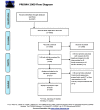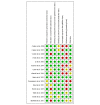Web-Based Interventions Supporting Adolescents and Young People With Depressive Symptoms: Systematic Review and Meta-Analysis
- PMID: 29222079
- PMCID: PMC5741826
- DOI: 10.2196/mhealth.8624
Web-Based Interventions Supporting Adolescents and Young People With Depressive Symptoms: Systematic Review and Meta-Analysis
Abstract
Background: Although previous studies on information and communication technology (ICT)-based intervention on mental health among adolescents with depressive symptoms have already been combined in a number of systematic reviews, coherent information is still missing about interventions used, participants' engagement of these interventions, and how these interventions work.
Objective: We conducted a systematic review and meta-analysis of trials to describe the effectiveness of Web-based interventions to support adolescents with depression or depressive symptoms, anxiety, and stress. We also explored the content of the interventions, as there has previously been a lack of coherent understanding of the detailed content of the Web-based interventions for these purposes.
Methods: We included parallel randomized controlled trials targeted at adolescents, or young people in the age range of 10 and 24 years, with symptoms or diagnoses of depression and anxiety. The interventions were from original studies aimed to support mental health among adolescents, and they were delivered via Web-based information and communication technology.
Results: Out of 2087 records identified, 27 papers (22 studies) met the inclusion criteria. On the basis of a narrative analysis of 22 studies, a variety of Web-based interventions were found; the most commonly used intervention was based on cognitive behavioral therapy. Meta-analysis was further conducted with 15 studies (4979 participants). At the end of the intervention, a statistically significant improvement was found in the intervention group (10 studies) regarding depressive symptoms (P=.02, median 1.68, 95% CI 3.11-0.25) and after 6 months (3 studies; P=.01, median 1.78, 95% CI 3.20-0.37). Anxiety symptoms (8 studies; P<.001, median 1.47, 95% CI 2.36-0.59) and moods and feelings (2 studies; P=.04, median 5.55, 95% CI 10.88-0.22) improved as well in the Web-based intervention group, but there was no difference in stress scores. However, adolescents in the intervention group left the study early more often, both in short-term studies (11 studies; P=.007, median 1.31, 95% CI 1.08-1.58) and mid-term studies (3 studies; P=.02, median 1.65, 95% CI 1.09-2.49). We did not find any studies that had assessed the costs of the Web-based interventions.
Conclusions: Despite widely reported promises that information technology use is beneficial to adolescents with depression, the results of our review show only short-term effects on adolescents' mental well-being, whereas long-term effects remain questionable because of the limited number of studies reviewed. Information about the economic benefits of Web-based interventions is still lacking. The quality of the studies, especially biases related to attrition rates and selective reporting, still needs serious attention.
Keywords: Internet; adolescent; depression; information and communication technology; intervention; meta-analysis; systematic review; treatment as usual.
©Maritta Välimäki, Katriina Anttila, Minna Anttila, Mari Lahti. Originally published in JMIR Mhealth and Uhealth (http://mhealth.jmir.org), 08.12.2017.
Conflict of interest statement
Conflicts of Interest: None declared.
Figures







Similar articles
-
Effectiveness of interventions that assist caregivers to support people with dementia living in the community: a systematic review.Int J Evid Based Healthc. 2008 Jun;6(2):137-72. doi: 10.1111/j.1744-1609.2008.00090.x. Int J Evid Based Healthc. 2008. PMID: 21631819
-
Psychological therapies for the treatment of post-traumatic stress disorder in children and adolescents (Review).Evid Based Child Health. 2013 May;8(3):1004-116. doi: 10.1002/ebch.1916. Evid Based Child Health. 2013. PMID: 23877914 Review.
-
Systematic reviews of randomised clinical trials examining the effects of psychotherapeutic interventions versus "no intervention" for acute major depressive disorder and a randomised trial examining the effects of "third wave" cognitive therapy versus mentalization-based treatment for acute major depressive disorder.Dan Med J. 2014 Oct;61(10):B4942. Dan Med J. 2014. PMID: 25283628
-
Internet and computer-based cognitive behavioral therapy for anxiety and depression in youth: a meta-analysis of randomized controlled outcome trials.PLoS One. 2015 Mar 18;10(3):e0119895. doi: 10.1371/journal.pone.0119895. eCollection 2015. PLoS One. 2015. PMID: 25786025 Free PMC article.
-
The relationship between persuasive technology principles, adherence and effect of web-Based interventions for mental health: A meta-analysis.Int J Med Inform. 2016 Dec;96:71-85. doi: 10.1016/j.ijmedinf.2016.04.005. Epub 2016 Apr 14. Int J Med Inform. 2016. PMID: 27117057
Cited by
-
Effectiveness of internet-delivered psychological treatments for children and adolescents with anxiety and/or depressive disorders: Systematic review and network meta-analysis.Int J Clin Health Psychol. 2024 Jul-Sep;24(3):100487. doi: 10.1016/j.ijchp.2024.100487. Epub 2024 Jul 18. Int J Clin Health Psychol. 2024. PMID: 39114408 Free PMC article.
-
Impact of a Web Program to Support the Mental Wellbeing of High School Students: A Quasi Experimental Feasibility Study.Int J Environ Res Public Health. 2019 Jul 11;16(14):2473. doi: 10.3390/ijerph16142473. Int J Environ Res Public Health. 2019. PMID: 31336738 Free PMC article.
-
Attrition rates in trials for adolescents and young adults at clinical high-risk for psychosis: A systematic review and meta-analysis.Early Interv Psychiatry. 2020 Oct;14(5):515-527. doi: 10.1111/eip.12864. Epub 2019 Aug 18. Early Interv Psychiatry. 2020. PMID: 31422583 Free PMC article.
-
Three-arm randomised controlled trial of an m-health app and digital engagement strategy for improving treatment adherence and reducing suicidal ideation in young people: study protocol.BMJ Open. 2022 May 30;12(5):e058584. doi: 10.1136/bmjopen-2021-058584. BMJ Open. 2022. PMID: 35636787 Free PMC article.
-
Impact and Feasibility of Information Technology to Support Adolescent Well-Being and Mental Health at School: A Quasi-Experimental Study.J Multidiscip Healthc. 2021 Jul 7;14:1741-1753. doi: 10.2147/JMDH.S311788. eCollection 2021. J Multidiscip Healthc. 2021. PMID: 34262287 Free PMC article.
References
-
- Lyon AR, Ludwig KA, Stoep AV, Gudmundsen G, McCauley E. Patterns and predictors of mental healthcare utilization in schools and other service sectors among adolescents at risk for depression. School Ment Health. 2013 Aug 01;5(3) doi: 10.1007/s12310-012-9097-6. http://europepmc.org/abstract/MED/24223677 - DOI - PMC - PubMed
-
- Ec.europa.eu. [2017-11-04]. Mental health systems in the European Union member states, status of mental health in populations and benefits to be expected from investments into mental health, European profile of prevention and promotion of mental health, 2013 https://ec.europa.eu/health//sites/health/files/mental_health/docs/europ... 6sO01PXqS.
-
- Barak A, Grohol JM. Current and future trends in internet-supported mental health interventions. J Technol Hum Serv. 2011 Jul;29(3):155–196. doi: 10.1080/15228835.2011.616939. - DOI
-
- Lenhart A. Pew Internet. 2015. [2017-11-04]. Teens, social media & technology overview, 2015 http://www.pewinternet.org/2015/04/09/teens-social-media-technology-2015/ 6sO0Ewves
LinkOut - more resources
Full Text Sources
Other Literature Sources
Miscellaneous

